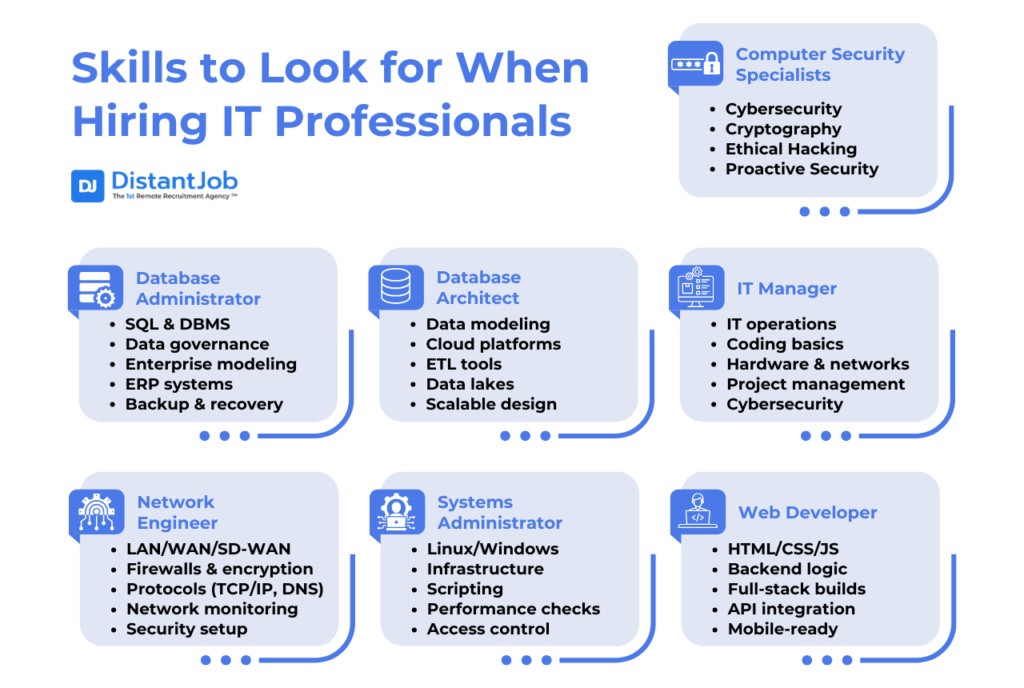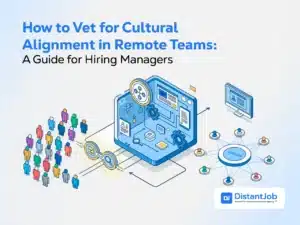Servers fail, databases are compromised by ransomware, a Hard Disk gets corrupted, the CRM is slow, and no one in the company knows what to do. This type of scenario happens more often than you think. According to a 2024 study by EMA Research and Big Panda, downtimes might cost up to $14,056 per minute, so it’s important to hire the right IT specialist from the start.
Of course, hiring an IT specialist is more than just looking for a crisis solver. For example, big companies like Waze use it to calculate routes with data and machine learning. From stock control, logistics, and even predicting events using data, an IT specialist can do it for you and so much more.
This guide offers a straightforward path to hiring the ideal IT professional. We’ll walk you through essential steps like pinpointing the role’s requirements, deciding on a competitive salary, carefully assessing candidates, performing background checks, and finally, making a compelling job offer. This efficient and practical strategy is designed to help you swiftly attract and secure top IT talent for your team. Let’s get started with the basics.
How to Hire an IT Specialist?
Hiring an It professional is no different than hiring another tech employee. You will most likely do the same thing as hiring before:
- Job Posting
- Review resumés
- Interview the candidates
- Assessing the candidates’ skills with tests
- Make a job offer to your chosen candidates
But, just as with the most important things in life, nothing is as simple as it seems at first glance.
I’m assuming you know what you want and will not babysit you on how to write a job post or how to review a job application.
What I am going to teach you instead is:
- Which skills do you have to look for when you hire an IT specialist
- How to interview an IT expert
- Which tests to use with an IT candidate
- What kind of offer makes them accept the deal
After all, we will discuss something most articles about hiring IT specialists don’t want to tell you about: the IT job market. As soon as you get what is happening in the market, you will have a deep insight into IT specialists that most recruiters don’t have. You will be able to hire the best successfully.
1. Key Skills to Look for When Hiring IT Professionals
Consider two kinds of skills before hiring an IT professional: hard skills and soft skills. Hard skills are technical skills, acquired with study and practical experience. Soft skills are trickier: they’re social skills. An IT expert must communicate efficiently, show teamwork, collaboration, problem-solving abilities, and even leadership when needed.
Types of IT Specialists and Hard Skills
Not all IT specialists are the same, they come in different areas of expertise. Therefore, they come with different hard skills as well:
Computer Security Specialists
Computer security specialists protect your systems from threats like hackers and malware. They excel in cybersecurity skills, such as cryptography, ethical hacking, and proactive security.
Database Administrator
Database administrators are responsible for maintaining, operating, and implementing the company’s database and data storage. In short, they employ data strategies, governance, and high-level models for enterprise-wide data management. They are experts in business knowledge and use ERP systems. They are also very proficient in SQL and DBMS.
Database Architect
A database architect is responsible for designing and managing database systems for your company. Their goal is to find secure and scalable solutions through data architecture. They are superb at data modeling, cloud platforms, using ETL tools, and building data lakes. Database architects design database systems, while database administrators operate on such systems.
IT Manager
An IT Manager checks all aspects of information technology inside your company. They oversee, develop, and implement technology operations, systems, and infrastructures. In short, they ensure that all systems run without problems. In such a leadership role, they must master skills like coding, database, hardware, network, and IT management. They also must be familiar with software development, operating systems, and security.
Network Engineers
A network engineer designs, implements, and sustains your company’s network, allowing information and resources to flow from computer to computer. They must establish and maintain a secure network (with firewalls and encryption), be it a local area network (LAN), a wide area network (WAN), or a software-defined wide area network (SD-WAN).
Systems Administrator
SysAdmins manage and maintain IT infrastructure, focusing on stability, reliability, and user support. They need a deep understanding of operating systems such as Linux or Windows, knowledge of network protocols, hardware, and databases, and proficiency in scripting and security.
Web Developer
Web developers are responsible for developing and maintaining the company’s website. They come in three flavors: full-stack, front-end, and back-end. In short, they specialize in how a website works, from a user’s perspective, an inner system’s perspective, or both.

IT Specialist’s Soft Skills
While IT specialists widely vary in their technical abilities, the soft skills they all need are similar.
| Soft Skill | Description |
| Team-Work | Ability to work and collaborate with a team. |
| Emotional Intelligence | Mental resilience and maturity to cope with frustration. |
| Asynchronous Mindset | Capability to communicate with others asynchronously. |
| Communication | It allows us to transmit and understand important information. |
| Conflict Resolution | Solve misunderstandings without hindering work. |
| Problem-Solving | Solve problems through reasoning and testing solutions. |
2. How to Conduct an Effective Interview with IT Professionals
Interviewing an IT specialist for hiring is all about vetting your candidate’s best qualities and worst flaws. Focus on their hard skills, soft skills (especially problem-solving and communication), and ability to adapt to changing technologies. Structure your interview with technical questions (what they know), behavioral questions (what they do), and questions designed to assess their fitness in the company culture.
Here’s a step-by-step quick guide on how to conduct technical interviews remotely. With easy adaptation, you can perform it face-to-face. You may apply it to non-IT specialists as well.
3. Tests to assess IT specialists’ skills
Assessing IT specialists’ skills with tests will make sure that your candidates’ skills are honed and updated. You may use a combination of coding challenges, simulations, real-world scenarios, and case studies.
The most common coding tests are Live Coding and Take-Home Challenges. If you value soft skills more than hard skills, go Live Coding, and if one of your team members is available, make them program together. If you are more worried about technical capabilities, ask your candidates to take a deeper challenge at home or ask about their best personal projects.
Just be aware that IT specialists hate being tested, especially passive candidates with their hands full of work. Make sure the test has a purpose. Otherwise, they may avoid your challenge or get stressed/angry, hurting your employer brand.
4. Making an Offer They Can’t Refuse
When you make an offer to a tech professional, a big salary is an upsell, not the main attraction. Don’t forget that your candidates want value as much as your company does.
The solution is to offer something else:
- a bigger challenge (to avoid boredom),
- career opportunities,
- mentorship,
- remote work,
- profit sharing,
- stocks.
Those are more enticing possibilities than just offering a big paycheck.
That doesn’t mean salary doesn’t matter. A common mistake is offering a lower or standard salary. You can’t complain about skill gaps for a senior job vacancy if you offer junior compensation. You get what you are willing to pay for.
The IT Job Market
The IT job market in 2025 is showing us mixed signals, with both growth and decline. While IT employment is increasing overall, many IT sectors and specific roles are seeing layoffs or decreased hiring. In-demand areas include software development, data science, cybersecurity, cloud computing, and AI/Machine Learning.
There are more than 7 million tech job postings out there, reflecting a 33% month-over-month increase and a 16% rise compared to the previous year. Almost half of IT professionals are actively seeking new roles. It’s a huge increase compared to the previous year (29%).
Therefore, Tech is not dead as the doomsayers say. But it’s surely changing. Companies complain about skill gaps and fire IT specialists en masse, mirroring what the Big Techs do. Tech workers believe it’s all a maneuver to force them to accept lower salaries.
There is an MBA guy, without any experience in Tech, who decided to investigate the productivity of IT specialists. His chosen metric was how much programmers code per month. He believes that 50% of Google’s IT Staff are slacking off.
Sorry, let me address the elephant in the room here: IT specialists don’t code every day. Sometimes they perform automations, meetings, and supervise others… They do much more valuable stuff than just producing lines of code – stuff that an AI can’t do for you.
As you may have guessed by now, no IT specialist is happy. It seems like a dreadful scenario for them. If they receive an offer from your company, they will likely receive it with mistrust.
Your job, while hiring an IT specialist, is to bridge the gap between your company and any potential candidates and reach them.
The best opportunity to hire an IT specialist
This whole drama in the IT Market is a huge opportunity for your company! You can’t miss it! Let me give you a historical example:
In 1492, King Ferdinand expelled the Jews from Spain by proclaiming the Alhambra decree. Ottoman Sultan Bayezid II deployed the Ottoman Navy to take the Sefardic Jews into his Empire. About this, he claimed: “Those who say that ‘Ferdinand is a wise king’ are fools indeed. By expelling the Jews, he made me richer, and himself, poorer.” A single year later, the Ottomans got their first printing press, the first of the many Jewish contributions to the Empire.
Bayezid II would laugh at the Big Techs, which gave up on all their IT experts. They will lose their know-how, so this is your opportunity to obtain it by hiring them.
This is your chance to get someone who worked at Google, IBM, Nvidia, and many other Big Techs. Just imagine what sorts of solutions they can offer to your company!
Do You Need a Freelancer Or A Full-Time Remote Specialist?
The choice between the two should largely depend on the needs of your IT position. For example, having an IT support staff that is a freelancer may not yield the best results. On the other hand, it may make sense to hire a freelance web developer since such work is not available all the time.
When should I hire a freelancer? You should look for one if:
– You want someone for a short-lived job that doesn’t require heavy support after release.
– You want someone to work on a project, but need someone to fill that role until you can find a full-time professional to do it.
When should I hire a full-time professional? You should look for one if:
– You want someone for a long project or one that requires heavy support after release.
– You want someone to work on many short-lived projects in the company over time.
– You want someone who can eventually grow and take on other responsibilities at the company.
– You want someone heavily invested in your project and the company’s success.
Where Can You Recruit IT Professionals?
- Freelance platforms
- Job listing sites like Indeed or ThinkRemote
- Look internally for current employees who have relevant IT skills
- Headhunting from your competitors
- Post the job on your website or social media channels
- Remote IT recruitment agencies like DistantJob 😉
Need Help?
Hiring IT professionals has no tried and true method: it all depends on what you’re looking for and the resources you have available to do so.
If you’re struggling to find professionals to help you with your projects, then our expert recruiters can be your valued partner. We have more than a decade of experience finding the best remote developers and IT specialists out there to work for our clients, and we can do it for you too. We conduct rigorous vetting processes that will guarantee a professional, culture-fit employee for your company in as little as 2 weeks. Just book a discovery call today and learn more!
FAQ about how to hire an IT Specialist
To hire right, a proper understanding of the job requirements is required, and evaluate the best-suited candidate who can fulfill those demands and are a great fit for your company culture.
If on-site work isn’t mandatory for your business, you should absolutely consider it! Hiring a remote professional brings many advantages.
Look for IT consultants with experience in the areas you need assistance with, good customer service/communication/technical skills, references from past clients, a background/certifications check, and flexibility to create the best solution for your needs.





